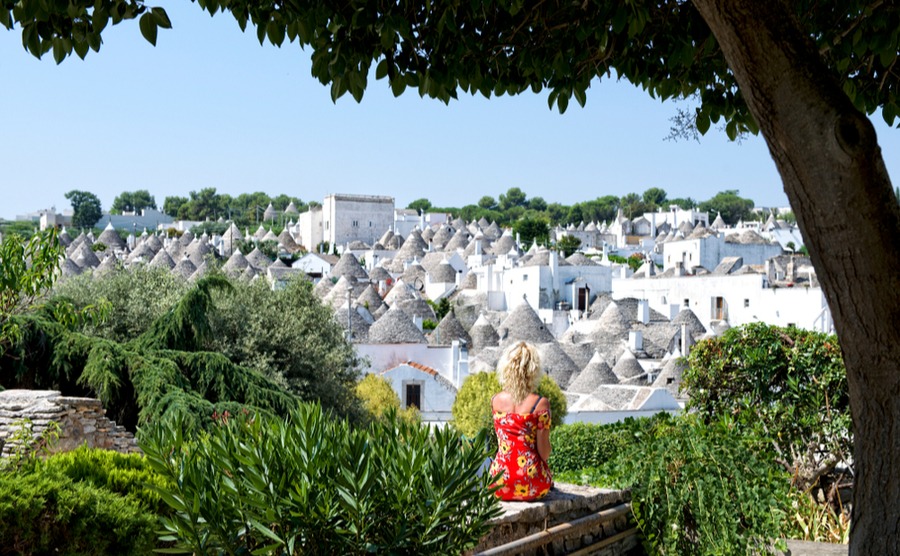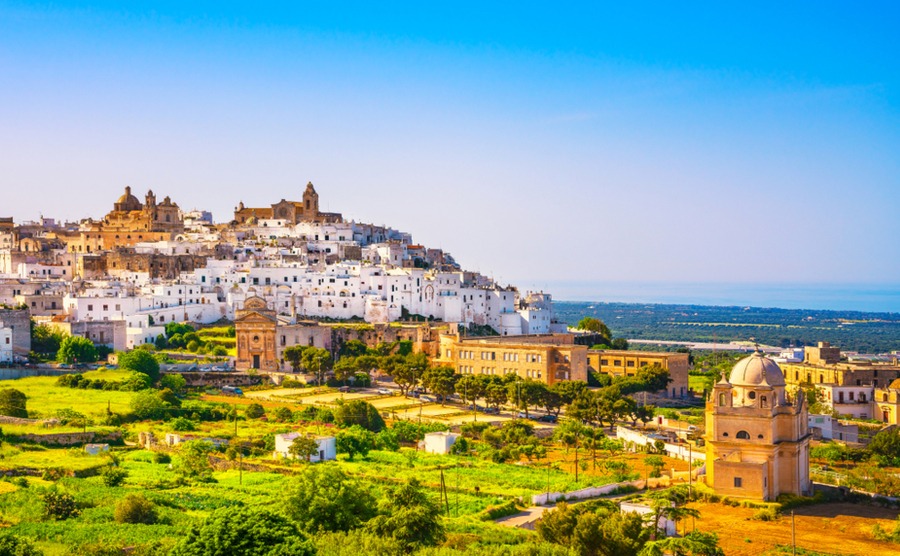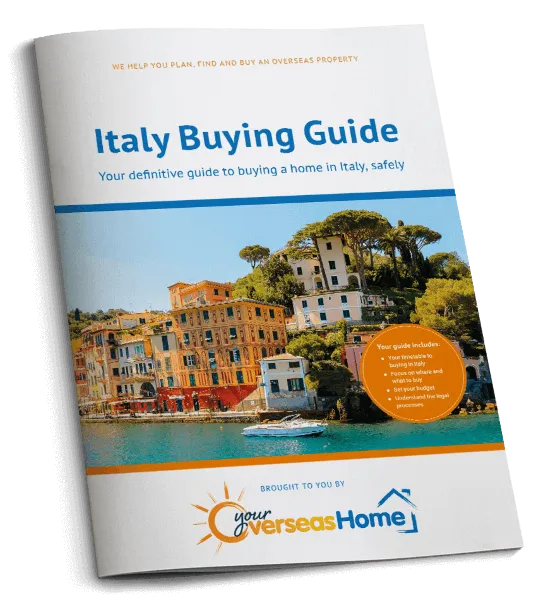If you are looking for a sunny piece of Italy that is affordable, easy to get to, and offers a healthy Mediterranean lifestyle, then the region of Puglia is a superb choice.
Life in Puglia is about relaxing and enjoying the good things in life. You will taste the difference in the sun-ripened fruit and vegetables that you buy from the local market, the delicious cheeses and farm produce. Many properties have their own olive and fruit trees and plenty of space to grow your own herbs and vegetables. Property prices in the countryside are very reasonable, and you are likely to get a bigger plot than you could afford back home. You may be tempted to get a dog, or even some chickens.

Could you picture yourself in Alberobello?
Your local town will invariably have a historic centre with a piazza. Here you can sit outside and enjoy a cappuccino and a cornetto cioccolato (chocolate croissant). There will be pizzerias and restaurants using fresh local produce and seafood. With 800 km (497 miles) of coast and two seas, there is a good variety of fish.
As well as supplying 40% of Italy’s olive oil, Puglia has vineyards producing quality wines. Costing around €1.50 a litre, it’s worth a visit to one of the wineries in Manduria, to stock up when friends and family come to visit. The gelato (ice-cream) is sublime and often made on the premises using fresh fruit. But, Just wait until you see the delicious cakes in cafes and bakeries in the winter, and the thick hot chocolates (cioccolato caldo).
Property prices in the countryside are very reasonable, and you are likely to get a bigger plot than you could afford back home
With Puglia’s gorgeous weather you will want to get out and explore. Puglia has some unique and interesting architecture, from the cone-shaped trulli houses made of limestone to large masserie built with blocks of sandstone. In Lecce you can admire the craftsmanship of the carved stone facades of the churches. In the medieval hill-top town of Ostuni you can wander the maze of narrow streets and enjoy panoramic views to the sea. There are many events and concerts to enjoy, such as the Torneo dei Rioni in Oria, the Carnival of Putignano and La Notte della Taranta and each town has a festival for its patron saint.
These festivals usually include amazing illuminations, street entertainers and concerts. You get a real sense of community and the desire to share the culture and traditions with visitors and the younger generation.
Don’t spend any money on your move abroad until you’ve read The Currency Guide to Emigration, free to download.
There are many opportunities for keeping fit and active too. Road cycling is very popular and dance and exercise classes. Other sports include tennis, golf, basketball, horse riding, snorkelling and wind surfing. There are some great beaches and coastal nature reserves for long walks or a swim in the sea.
Other pastimes this beautiful region may inspire you to take up include art, photography and writing. In Brindisi the cinema does regularly screenings in English and in Ostuni a group of, mostly British people, have started a choir. If you aren’t ready to completely give up working you may enjoy teaching English or renovating a property to rent to tourists. Buying a property that needs a bit of work can be very rewarding, especially if you are keen on DIY. Plus, you get to go shopping for tools and tiles and kitchens etc. and choose what you want for your new home.
Where should we retire?
It’s lovely living in the peace and quiet of the countryside, but as you get older it’s also important to be within an easy drive of a town with shops, restaurants, a post office and most importantly pharmacies, doctors and hospitals. In Puglia you can have a quiet rural location and be near a town with all the facilities you might need. Road links are good and some towns are on bus and train routes, and fares are cheap. For example, a 30-minute train ride from Brindisi to Lecce costs just €2.90.
Get your free Italian Viewing Trip Guide today.
Big towns such as Bari, Brindisi, Lecce, Ostuni, Francavilla Fontana, Fasano, Martina Franca and Ceglie Messapica have hospitals and industrial zones with large supermarkets. There are also out of town shopping centres near Brindisi, Mesagne, Taranto, Lecce, Fasano and Casamassima.

Ostuni
Homes on the outskirts of Ostuni are popular with British buyers, including the area towards Brindisi airport. This includes Carovigno and San Vito dei Normanni, where there is a growing community of British expats.
For a quiet location in a slightly hillier setting, how about a trulli in the beautiful Itria Valley? Alberobello, Locrotondo and Martina Franca are all charming locations. For all year round living and easy access to Brindisi airport the towns along the Brindisi to Taranto road (SS7), Mesagne, Oria, Francavilla Fontana and Grottaglie, each have interesting historic centres with a castle, but also good facilities.
These four towns are all great to have as your local town, as they haven’t yet been discovered by many tourists. They each have a friendly family feel to them with many free festivals and cultural events organised for everyone to enjoy. Lecce and villages in the Salento are also very appealing. This is where Helen Mirren and Meryl Streep have bought homes.
The property market
The boom in tourist numbers to Puglia has also helped to increase the number of property buyers. Particularly those looking for a holiday home, a place to retire to, or a property where they can live and make an income from tourism, such as a B&B or holiday rental. The price of properties are still very affordable and yet they have good holiday rental potential. At the end of 2018, Puglia boasted a 10% increase in total tourism and +7% in overnight stays.
Some foreign buyers are buying property in Puglia now, while prices are low, with the plan to retire here in the future.
Some foreign buyers are buying property in Puglia now, while prices are low, with the plan to retire here in the future. In the meantime, they use their property for holidays and have an income from tourists. Most foreign buyers are investing in the southern half of the region, particularly in the Itria Valley, coastal areas between Brindisi and Bari, and around Lecce. A popular choice for retirees are countryside villas with a pool and garden, located a short drive from a town with all amenities. In most areas you are never more than thirty minutes’ drive from the sea.
What are property prices in Apulia?
If you are prepared to do a renovation project it is possible to buy a small Trulli, lamia or villetta from €30,000, but they tend to be very small and need a lot of work and money spent on them. As Italians prefer to live in town, near work and schools, there are many countryside properties for sale that are very basic, as they have been used mainly for storage and weekend breaks and summer holidays.
We can put you in touch with a trusted lawyer for advice about purchasing property.
There are some bargains to be found, but you should be prepared to have money in the budget for things like new tiles, bathroom, kitchen, heating and electrics. However, you can find habitable villas from €110,000 that may just need modernisation. A two-bedroom villa with a garden that’s ready to move in, costs from €195,000. A two-bedroom villa with a pool from €200,000. A two-bedroom apartment in Ostuni from €120,000.
Should I make Puglia my main residence?
If you are moving from the UK, I would personally recommend becoming resident in Apulia before the end of the Brexit transition period, which is on the 31 December 2020. I say this only because, if you are a UK national legally resident in Italy by the end of the implementation period your rights will be protected under the Withdrawal Agreement. Very little is expected to change for those retiring after that date, it’s just that the future relationship is yet to be negotiated and as a non-EU citizen there could be more red-tape.
However, this hasn’t put off the Americans and Australians that have made Puglia their home, and the people of Puglia are well known for being very welcoming. Don’t be surprised to find your Italian neighbour on your doorstep with a bag of tomatoes and a bottle of wine or olive oil.
How will Italy look for expats after Brexit? Discover in our Guide to Italy After Brexit.
There are tax benefits too. If you plan to make your Italian property your main residence you will only pay 2% stamp duty when you purchase the property, as opposed to 9% for a second home (minimum €1,000). Once you are a registered resident you will usually be exempt from council tax (IMU) on your main residence (except luxury homes) and only pay it on any land that comes with the property. This could be less than €150 a year in Puglia. You can also get a discounted rate on your electric bills. One of the main things retirees in Puglia comment on is the low cost of living compared to the UK.
FIND your dream home in Puglia here.
Another good reason to retire to Apulia is a new Italian Budget Law 2019 (Law no. 145/2018) which has introduced a favourable tax regime for retirees. It aims to encourage retired people living in foreign countries to move their residence to the southern regions of Abruzzo, Apulia, Basilicata, Calabria, Campania, Molise, Sardinia or Sicily. One condition is that you set up residence in a town with a population less than 20,000.
According to the new provisions, all income sourced outside Italy will be subject to a 7% substitutive tax, which will apply for five years. With changes in government, tax incentives can also change, so it’s advisable to get legal advice to get the most up to date information and to find out if you are eligible.
What’s the climate like?
Are you fed up with being stuck indoors looking at grey skies? If you yearn for fresh air and sunshine, the Apulia region is definitely the place for you. Puglia boasts a wonderful Mediterranean climate that invites you to spend more time outside, in the garden, on the beach or visiting new places.
Spring comes early and is generally warm and sunny, with temperatures rising to the early 20s Celsius (early 70sF) by the end of April. Summers are long, hot and dry and last from the end of May through to the end of September. Temperatures can rise as high as 35C (95F) in July and August, especially on low lands. However, on higher ground and on the coast, where you can get an afternoon breeze, the heat is less intense.
Winters are mild, with daytime temperatures generally between 12 and 15C.
By the end of the summer the sea warms up wonderfully to the mid 20s C too, making swimming and bathing very pleasurable. Apulian summer afternoons are made for relaxing, while the evenings are a time for all ages to stroll in town, sit outside cafes and restaurants and enjoy free events, festivals and concerts in the piazza. It’s just a matter of adjusting your daily routine to fit in with the weather and local life, which comes alive in the mornings and evenings.
The autumn generally remains quite warm with temperatures around 20C. There are storms and rain, but they tend to pass over quickly and then the sun comes out again. Winters are mild, with daytime temperatures generally between 12 and 15C. It does drop a lot in the evenings though, which is when you’ll need the heating on. Like everywhere in the world today, we can get the occasional freak weather, like cold winds, storms and even snow, but they pass by quickly.
Getting to Apulia
By plane:
There are international flights coming into the airports of Brindisi and Bari all year round. Direct flights to Brindisi with Ryanair from London Stansted, Manchester, Dublin, Paris, Bruxelles, Berlin etc. Direct flights to Bari with Ryanair from Stansted, Liverpool, Dublin, Bruxelles, Paris, Berlin etc. Plus internal flights to Bari and Brindisi from major Italian cities such as Rome, Milan and Venice, for those arriving from further afield, such as the USA and Australia. Easyjet fly Gatwick to Bari (year round), Manchester to Bari (April to October) Bristol to Brindisi and Gatwick to Brindisi (May-October). British Airways fly Heathrow to Brindisi and London Gatwick to Bari.
By car:
If you want to drive down to Puglia, it’s a pleasant and straightforward run through France and down Italy’s east coast. It takes about nineteen and half hours from Calais to Ostuni. Some people bring their own car when they first move down to Apulia, so that they can bring personal belongings and pets, and make a bit of a holiday of the trip down, by stopping off at places on the way. You can drive your UK car in Italy for six months before you need to register it. There are many hire car companies located at Brindisi and Bari airport with competitive rental rates, should you need to hire a car until you are able to buy an Italian one.
By train:
You can travel from London to Paris by Eurostar (2hrs 40) then from Paris to Milan by SNCF high speed train (7hrs) and finally Milan to Bari (10hrs 40). You can find the whole journey on thetrainline.com. Outside the peak holiday seasons you can get some great flight prices from the UK to Bari and Brindisi.
So, what are you waiting for? The blue skies of Puglia are ready to welcome you.











